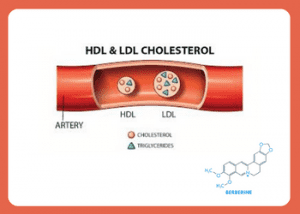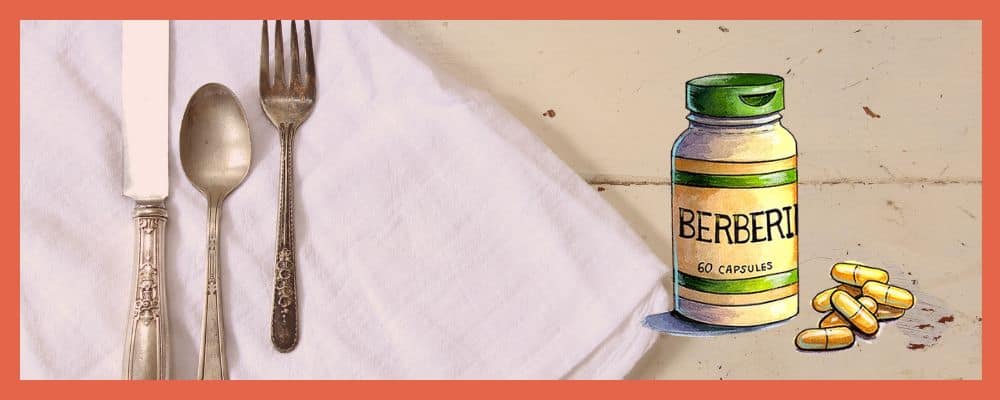Can I take berberine on an empty stomach? Berberine is a rare and advantageous product derived from natural sources with immense benefits for our bodies.
Not only does it help maintain healthy blood sugar levels, but also supports cardiovascular health while aiding in weight loss! Its organic components work on the molecular level to promote overall well-being.
When considering the wide range of successful supplements offered by pharmaceutical companies, berberine stands out as one of the most effective.
Table of Contents
What is Berberine?

Berberine is a highly potent and natural supplement, with a range of remarkable health advantages.
Extracted from the roots, stems, bark, and rhizomes of select plants and trees, it carries an unmistakable yellow hue that glows brightly under UV light – plus its bitter taste reveals it belongs to alkaloids; compounds comprising of at least one nitrogen atom.
How Does Berberine Benefit You?
- Supplementing your gut flora with helpful bacteria can be a great way to promote optimal health and wellness. By introducing more beneficial microbes into the digestive system, you’ll increase nutrient absorption and digestion while encouraging a stronger immune system.
- Berberine has been proven to reduce insulin resistance and enhance its effectiveness, thus making it more useful in the human body.
- By preserving the breakdown of carbohydrates in the intestinal tract, helps maintain overall gut health.
- By reducing the production of surplus sugar in the fatty liver, this revolutionary product helps improve overall health.
Berberine is immensely beneficial in helping your body break down sugar stored in cells.
 Studies have proven that one gram of this miraculous element can reduce a person’s blood sugar level by 20%, taking someone with diabetes to an average glucose reading!
Studies have proven that one gram of this miraculous element can reduce a person’s blood sugar level by 20%, taking someone with diabetes to an average glucose reading!
Studies have shown that berberine has the same effect on diabetes as many leading oral drugs: glipizide, rosiglitazone, and metformin.
In fact, a review of 14 studies found evidence that berberine can reduce blood lipids like cholesterol and triglycerides by 12% while also lowering hemoglobin A1C levels.
By making positive lifestyle changes, you can amplify the power of berberine. Online discussions and reviews are full of stories from people whose lives have been positively transformed with this supplement.
With thousands upon thousands of glowing testimonials online showing its efficacy in both studies and real life, it’s no wonder that so many individuals rely on berberine for their health needs.
How Quickly Does Berberine Work?
Berberine’s effectiveness varies depending on the condition being treated and your particular body. Some studies have found that it may take effect right away, while others suggest you need to wait a few weeks before noticing any changes.
Regardless of when you start seeing improvements in your health markers though, one thing is certain – berberine is an effective supplement for many different medical conditions!
Take high blood sugar levels for example berberine has the power to lower them within just 3-4 weeks. It can also reduce HbA1c, a long-term measure of Glucose concentration control after only three to four months have passed. Likewise, it may take up to three full months before you witness cholesterol levels decreasing due to taking this supplement.
| Property | Description |
|---|---|
| Absorption | Research demonstrates that Berberine is easily absorbable by the body when taken orally, with peak plasma concentrations being achieved within two to three hours of consumption. |
| Bioavailability | It has proven to be highly bioavailable, meaning that a substantial quantity of this compound can get into the bloodstream and be put to use by our bodies. |
| Inhibition of efflux transporters | It is incredibly effective at inhibiting the activity of two efflux transporters: P-glycoprotein (P-gp) and multidrug resistance protein 2 (MRP2). These proteins are usually found in gut and liver cells, blocking absorption. However, Berberine’s inhibition of these proteins frees it from obstruction, improving its absorbing rate even further. |
It’s essential to take into consideration that the potency of berberine may differ depending on elements such as dosage and length of treatment, as well as someone’s general health and medical history.
Berberine & Fasting: When to Take & How to Use?
Can You Take Berberine While Fasting? Absolutely, Berberine can be taken while fasting, regardless of the time. A typical dose of berberine supplement is 500 mg, 3 times per day, half an hour before meals.
It is recommended to take half an hour before meals to enhance its bioavailability, as studies suggest that berberine may be more effective when taken on an empty stomach or before a meal. You don’t have to take berberine with meals, it’s recommended to take half an hour before meals to enhance its bioavailability.
It’s important to note that different health conditions may require a different dosage and schedule, so it’s best to consult with a healthcare professional before starting any supplement regimen.
When taking berberine in combination with fasting, there are several critical points to consider:
- To optimize its absorption and effectiveness, berberine is recommended to be taken on an empty stomach. In fact, some studies indicate that taking berberine in the fasted state may be more beneficial as it can avoid certain gut and liver transporters which would otherwise reduce absorption.
- It’s noteworthy that further research found berberine to be easily absorbed no matter whether eaten with or without food.
- If you experience any sort of stomach discomfort while taking berberine on an empty stomach, it may be more pleasant to take it with a small amount of food.
- If you’re leveraging berberine to facilitate weight loss, it may be more advantageous to take the supplement before or during your meal in order to decrease hunger.
- It’s worth noting that, based on research findings, berberine might be more effective if taken with meals containing either fat or protein. This is because these specific nutrients can delay absorption and extend their effects on your body.
- If you are considering starting a supplement regimen, if you’re fasting, or have any pre-existing health conditions, it is essential to seek advice from a healthcare professional. Don’t take the risk of doing something that may be potentially harmful – consult with an expert first!
To summarize, consuming Berberine with or without food can have different impacts on its bioavailability. To maximize absorption of this supplement, an empty stomach is a likely ideal; however, if you experience any discomfort in your abdomen after taking it solo, pair the intake with a light snack. You will not face any stomach discomfort when taking berberine if you take it with a small amount of food.
Furthermore, those using berberine to aid lose weight efforts should consider ingesting the substance before or during their mealtime routine for optimal results.
Vital Information About Berberine Supplement and Benefits of Taking
One of the greatest advantages of natural supplements like Berberine is that they are just as effective as drug treatments, but come with no nasty side effects! It’s not surprising then that so many people turn to this herbal supplement for its range of health benefits; in particular, it helps keep your blood sugar levels under control.

Here are some potential benefits of taking berberine supplement:
- Lowering blood sugar levels: If you have type 2 diabetes or prediabetes, Berberine can be an effective solution for reducing your Glucose concentration levels and enhancing your insulin sensitivity. Studies have shown that consuming this natural supplement has the potential to lower one’s Glucose concentration significantly.
- Lowering cholesterol levels: Clinical studies have revealed that Berberine can effectively reduce total cholesterol, LDL cholesterol, and triglyceride levels for those who suffer from high cholesterol.
- Weight loss: Studies demonstrate that Berberine can substantially facilitate weight loss by triggering a decrease in appetite and stimulating the breakdown of fats within the body.
- Improving heart health: Clinical trials have demonstrated that Berberine can be a game-changer for those suffering from cardiovascular disease. This natural supplement has been proven to lower blood pressure, enhance endothelial function, and reduce inflammation.
- Reducing inflammation: Berberine is a powerful agent that may help reduce inflammation throughout the body. This potent substance could potentially be used to prevent or treat conditions such as metabolic syndrome, type 2 diabetes, and various types of cancer.
- Gut health: Berberine has been proven to be incredibly effective for promoting gut health, as it reduces the growth of harmful bacteria while simultaneously supporting advantageous bacterial proliferation.
- Reducing symptoms of depression and anxiety: Animal studies have revealed that Berberine can alleviate symptoms of depression and anxiety.
Berberine supplements are utilized by many people to improve their health and wellness, yet those with diabetes and metabolic syndrome receive the most value from these types of products. Additionally, taking a Berberine supplement can reduce signs of aging as well as protect you from certain chronic illnesses.
Side Effects
Here are some common negative effects that have been reported:
- Stomach discomfort: Some people may experience stomach discomfort, nausea, or diarrhea when taking berberine.
- Headache: It may induce headaches in a small subset of individuals.
- Allergic reactions: For some, taking berberina may trigger allergic reactions such as a rash, itching, or hives.
- Drowsiness: It has the potential to cause drowsiness in individuals, so it is important to be mindful of this when taking it.
- Low blood pressure: Individuals with low blood pressure should be cautious when taking berberina, as it may cause a decrease in their high blood pressure.
- Liver damage: Although rare, berberina ingestion can lead to liver damage. Therefore, those with existing liver ailments should exercise caution when taking this supplement.
- Interaction with medication: If you’re currently taking prescription medications, extreme caution is required when considering supplementing with Berberine as it may interact adversely with some drugs.
Frequently Asked Questions
Should You Take Berberine?
Although berberine appears to be generally safe in normal doses, more long-term research on its safety is needed. Some individuals have reported feeling gastrointestinal negative effects when supplementing with berberine, such as diarrhea, constipation, flatulence, or stomach pain. It is important to talk to your doctor first to ensure that it is a supplement that is approved for you by your doctor.
Can You Take Berberine Before Bed?
It has great potential in the treatment of insomnia and might have better clinical significance.
What is the Best Time to Take Berberine for Weight Loss?
Taking berberine for weight loss may be more effective when taken before or during meals, as it helps decrease appetite and fat breakdown. Research has shown that berberina decreases levels of hunger-stimulating hormones such as ghrelin while increasing hormones like GLP-1, PYY, and PP which are associated with satiety. In other words, taking berberina prior to eating may help reduce the amount of food consumed overall.
Despite the resurfacing of this promising supplement, it is crucial to note that additional research must be conducted to affirm its safety and performance in aiding weight loss. Additionally, since slimming down involves a variety of components like nutrition, physical activity, and habits; berberina should not be considered an exclusive cure-all for shedding pounds.
How Long Should I Take Berberine?
The length of time you should take berberine depends on your particular health condition and the person. Some research has revealed that beginning treatment with berberine can cause a few noteworthy developments in certain wellness markers within just several days, whereas other evidence discloses that it could require more than a couple of weeks to observe outcomes.
For instance, for elevated blood sugar levels, studies have indicated that taking berberine may decrease those levels within a 3-4 week period; additionally, it is able to lessen HbA1c (a long-term measure of controlling glucose) after 3-4 months. Similarly, when managing cholesterol issues it might need up to three months before any reduction is seen.
Can I Take Berberine After a Meal?

Yes, Berberine can be taken at any time of the day, yet for those looking to reduce weight, consuming it after a meal could provide more advantages. Research has indicated that taking berberine before or during a meal may help suppress appetite and boost fat breakdown in the body.
Since fat and protein in food can slow down the absorption of berberine, it’s suggested to take berberine with meals that contain them. However, even when taken on an empty stomach, berberine is still well absorbed into your body.
How long does it take for berberine to work for weight loss? While the timeframe for berberine to work on weight loss can vary from person to person, some studies suggest that it may take anywhere from several weeks up to a few months before any of its effects are seen.
Best Time to Take Berberine for Blood Sugar?
For optimal blood sugar regulation, berberine should be ingested prior to or during a meal. This supplement has been studied and found to decrease glucose levels by reducing the body’s absorption of carbohydrates from food as well as bolstering insulin resistance sensitivity.
By taking it before you eat, you can effectively stop the post-meal spike in your blood sugar level. To ensure that you are using this product correctly for maximum results, please consult with a healthcare specialist about dosage amounts and timing for the best outcomes.
Can I Take Berberine with Food?
Yes, you are able to take berberine with food! Berberine can be taken at any point during the day, and doing so while you’re eating may decrease stomach distress than taking it when you haven’t eaten. Always take berberine with food.
When Should I Take Berberine Morning or Night?
The optimal timing for taking berberine can vary based on individual factors, the intended health benefits, and potential interactions with other medications or supplements. Berberine is a natural compound found in certain plants, known for its potential effects on metabolism, Glucose concentration regulation, and overall health. The decision of whether to take berberine in the morning or at night should consider the following points:
Blood Sugar Regulation: If you’re taking berberine to help manage blood sugar levels, it might be beneficial to take it before or with meals, particularly those higher in carbohydrates. This can help maximize its impact on post-meal blood glucose levels.
Digestive Effects: Some individuals may experience gastrointestinal discomfort when taking berberine. Taking it with food can help mitigate these potential side effects.
Interaction with Other Medications: Berberine has the potential to interact with certain medications. If you are taking other medications, consult your healthcare provider before determining the timing of berberine consumption. They can provide guidance on avoiding potential interactions.
Sleep Disruption: Some people might experience mild stimulant-like effects from berberine due to its influence on cellular pathways related to energy metabolism. For this reason, taking berberine closer to bedtime could potentially interfere with sleep for some individuals.
Individual Lifestyle: Consider your daily routine and lifestyle. Taking berberine at a time when you are consistent and can remember to take it is important for consistent supplementation.
Personal Response: Some individuals might find that they respond better to berberine when taken at a specific time of day. Pay attention to how your body responds and adjust the timing accordingly.
In conclusion, there is no one-size-fits-all answer to whether berberine should be taken in the morning or at night. Factors such as your health goals, potential bad effects, interactions with medications, and personal response should all be taken into account. Consulting a healthcare provider before starting berberine supplementation is recommended to determine the best timing for your specific circumstances.
Final Words
With its capability to balance blood sugar levels, promote a healthy weight and support an immune system, it’s no shock that people are taking berberine for many different purposes.
In this piece of writing, I have endeavored to discuss all aspects of berberine – from side effects to proper use and timing – so you can make an informed decision about whether or not this supplement is right for you. Overall taking it on an empty stomach should be ok.
Supplementing with Berberine on an empty stomach may amplify its efficacy for certain health benefits such as improved Glucose concentration regulation and weight loss. However, it is important to remember that research has revealed that berberine is efficiently absorbed regardless of the consumption timing.
To ensure the safety of your health, it is imperative to discuss any supplement regimen with a healthcare specialist before beginning. Additionally, remember that weight loss has many components – such as dieting, exercise, and one’s lifestyle – so berberine should not be viewed as an instant solution for shedding pounds.
